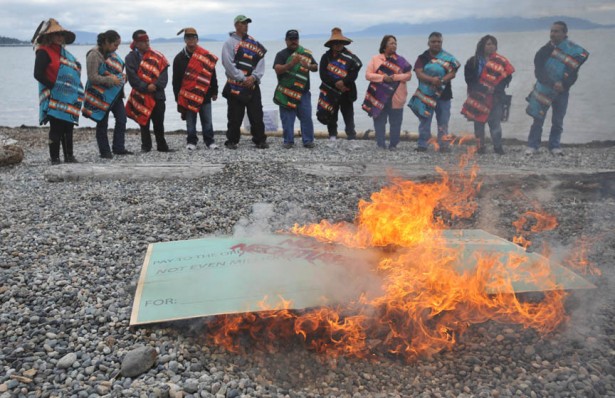
Northwest Tribes Step Up Opposition to Proposed Coal Terminals

Tribes are stepping up their fight against the terminals that would enable coal to be brought from Montana and Wyoming to the Pacific Coast for transport to China and the rest of Asia, and are being joined by non-Natives, with fishers at the forefront.
Cherry Point, Washington (Xwe’chi’eXen), was the site of a recent protest, a fleet of boats guided by fishers, both Native and non-Native, who gathered alongside the Lummi Nation to oppose the Gateway Pacific Coal terminal.
“We have to say ‘no’ to the coal terminal project,” said Cliff Cultee, Chairman of the Lummi Nation, in a statement. “It is our Xw’ xalh Xechnging [sacred duty] to preserve and protect all of Xwe’chi’eXen.”
In a resolution passed in September, the Affiliated Tribes of Northwest Indians (ATNI) requested a full environmental analysis of all the proposals—there are six, from as many companies—by the U.S. Army Corp of Engineers. Voting at the ATNI’s annual conference, the tribes expressed concern about how the transport system would affect health, natural resources and their economies, especially in the case of a spill.
“Along the Columbia River it’s cliff, highway, railroad, then river. Our communities are wedged between the railroad and the river. We’ve got nowhere to escape,” said Paul Lumley, Executive Director of the Portland-based Columbia River Inter-Tribal Fish Commission (CRITFC), in a statement from the agency, which also opposes the terminals. “If we cannot escape, neither will the coal.”
Three proposals of the six have gotten as far as to request permission from the Army Corp of Engineers to build terminals in Washington State: at the Port of Morrow on the Columbia River, at Longview, and at Cherry Point, just north of Bellingham. In addition to concerns over environmental hazards and potential danger to sacred sites, the tribes worry about economic impacts.
“This is not about jobs versus the environment,” said Jewell James of the Lummi Nation’s Sovereignty and Treaty Protection Office, in the Lummi Nation statement after the protests. “It is about what type of jobs are best for the people and the environment.”
The Lummi Nation is part of an intertribal coalition aimed at defeating the project and protecting the natural and cultural legacy of Xwe’chi’eXen, according to the tribe’s statement. During the protest, the tribes held a ceremony of thankfulness, remembrance and unity to solidify their commitment. The statement noted that Lummi Indians have the U.S.’s largest Native fishing fleet and have fished off Cherry Point for thousands of years.
They are also fighting to preserve another site, Xwe’chi’eXen, site of a 3,500-year-old village whose landscape is up for placement on the National Register of Historic Places. Another rally was held on September 21 to call for protection of that site from the development, which would risk damaging it.
The New York Times pointed out in a recent article that in this part of the country, tribes wield legal power that environmentalists and even politicians don’t have.
“As history has demonstrated over and over, especially in this part of the nation, from protecting fish habitats to removing dams, a tribal-environmental alliance goes far beyond good public relations,” The New York Times said in an October 11 story. “The cultural claims and treaty rights that tribes can wield—older and materially different, Indian law experts say, than any argument that the Sierra Club or its allies might muster about federal air quality rules or environmental review—add a complicated plank of discussion that courts and regulators have found hard to ignore.”
This issue has become a point of contention in this election, with coal industry players pouring millions of dollars into the campaign of Republican Mitt Romney, who is extolling coal’s virtues even as its price drops because of the availability of natural gas to do the same job.
The first public hearings for the projects began in late October, near the Lummi reservation.
More on the tribes’ fight against the coal transport terminals:
Northwest Tribes Fight for Treaty Rights in Face of Coal-Transport Plan